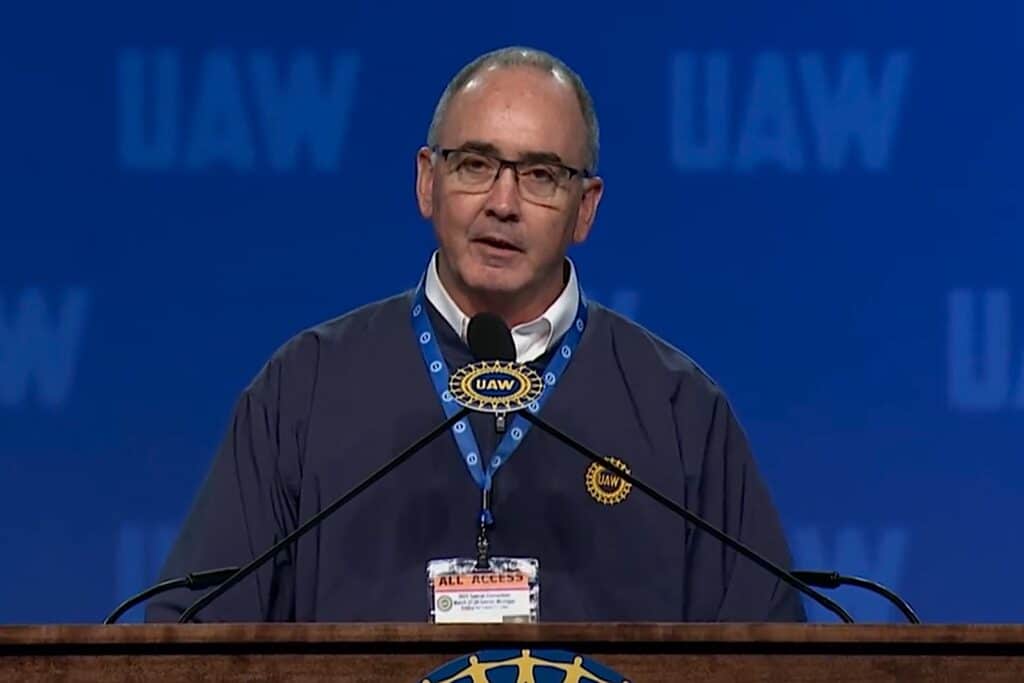In what is shaping up to be a contentious year for negotiations, 160 members of the United Auto Workers have walked off the job in a labor dispute at a factory in suburban Detroit supplying components for the Ford F-150.

On Wednesday May 17, workers at Constellium Automotive in Van Buren Township, Michigan went on strike after what the union described as “weeks of the company refusing to bargain in good faith.”
The plant supplies parts for the Ford F-150, F-150 Lightning, Explorer and Super Duty at six UAW-represented Ford assembly plants, according to the UAW, which said workers are members of UAW Local 174, are seeking to address health and safety issues, along with unfair discipline from management.
The vehicles are critical to Ford and production has been impacted over the past several months by various supply shortages or disruptions.
“Our negotiating team has met with the company nine times since April 18th,” UAW Region 1A Director Laura Dickerson said. “And on every single occasion, Constellium has made it very clear they have zero interest in taking our members’ proposals seriously. This is a prime example of employer arrogance forcing the hand of its workforce.”
The UAW has filed unfair labor practice charges against the company for bargaining in bad faith and expects to resume negotiations this week.
Second strike this month at supplier
The strike at Constellium is the second against a supplier this month by the UAW, which has taken a harder line since Shawn Fain took over the union presidency at the end of March. Fain is the first UAW president elected directly by the union active and retired members.

A strike at Clarios, which supplies 12-volt batteries to Ford, General Motors and Stellantis, began May 10 after more than 500 members of UAW Local 12 in Toledo, Ohio walked off the job after voting overwhelmingly to reject the company’s last contract offer. Officials from Local 12 said the proposed contract included concessions union members were unwilling to give.
Clarios has said it plans to use supervisory personnel to maintain production and shipments from the plant. At the end of last week, the company obtained an injunction, which limits the number of union pickets at the plants various gates. The company claimed union pickets were blocking truck traffic from the plant.
The injunction drew a rejoinder from Dave Green, the UAW’s new regional director in Ohio and Indiana.
“Using the courts as a weapon against working people standing up for their rights is extremely disrespectful,” said Green. “Clarios doesn’t need a judge to help them end this dispute — they need to come back to the bargaining table with a serious offer that our members can accept.”
Ultium ultimatum
Green recently held a meeting from the new Ultium Battery Plant in Lordstown, Ohio to prepare for a contract fight at the new plant, which is operated joint General Motors and LG Energy. Green and Fain have said wages at the new Ultium plant in Lordstown, which employs approximately 1,100 workers, are too low considering the hazards and skills required.

The Ultium contract remains unresolved and with the UAW scheduled to open contract talks with Detroit’s automakers this summer, the union appears poised to demand the battery plant be covered by the next master agreement between GM and the UAW. The current master agreement expires Sept. 14.
The union’s upcoming negotiations with GM, Ford and Stellantis are expected to be difficult.
Meanwhile, the striking workers at the Clarios plant outside Toledo have gotten support from Senator Sherrod Brown (D-Ohio.) Brown, who is facing a difficult re-election campaign in 2024, wrote a letter to Clarios management, saying he was “in support of the members of UAW Local 12 who are currently exercising their rights to strike for fair pay they’ve earned.”
Rep. Marcy Kaptur (D-Ohio), whose district includes parts of northwest Ohio, also visited strikers on the picket line, and several other elected officials have publicly shown their support.
Fain has said the UAW, long an instrumental element of the Democratic party, will no longer support politicians, who do not support issues critical to the union. In a move that attracted headlines, Fain declined to endorse President Joe Biden until he showed more specific support for union members during the transition to electric vehicles.







